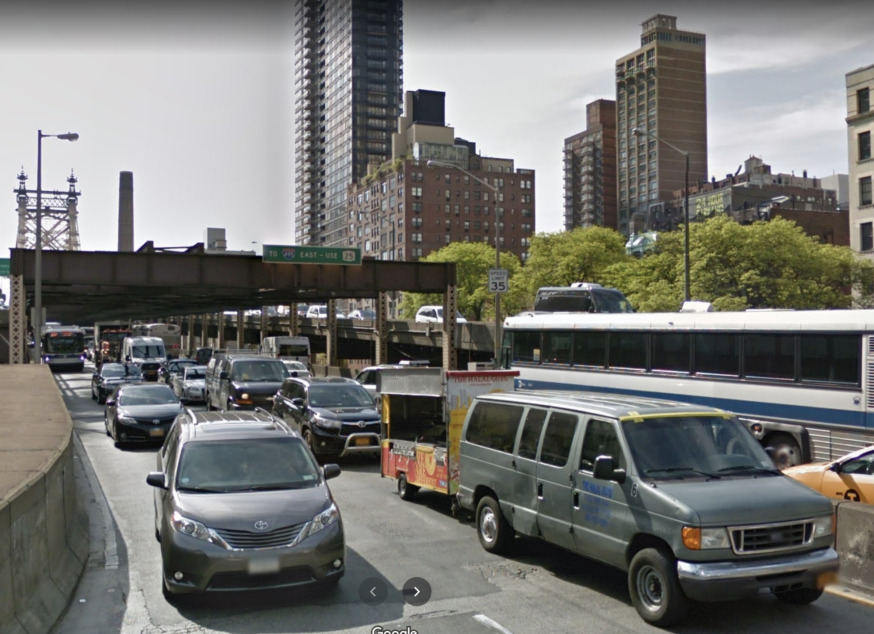
Traffic heading into Manhattan from the Queensboro Bridge (Google Maps)
March 30, 2021 By Allie Griffin
New York City’s long-delayed plan to charge drivers entering Manhattan below 60th Street is a step closer to becoming a reality.
The Biden administration notified city and state officials Tuesday that they can move forward in conducting an environmental review of the congestion pricing plan– which is required before the proposal can go into effect.
The Federal Highway Administration advised local officials that they could undertake an “environmental assessment” of the plan as opposed to a longer “environmental impact statement.”
An environmental assessment generally requires less time to complete and is less rigorous than an environmental impact statement, unless significant impacts are identified.
The plan to toll drivers who enter Manhattan below 60th Street was set to go in effect at the start of the year, but was delayed by the Trump administration, MTA officials said.
The Trump administration didn’t provide any details as to how the state should conduct the environmental review process, which blocked it from moving forward with the plan.
The decision of Biden’s FHWA to allow the state to perform a simpler environmental assessment is a win for supporters of congestion pricing.
The congestion pricing plan could generate $15 billion over four years for the MTA for much-needed capital improvements. The program would also help reduce traffic congestion in busy sections of Manhattan, improve air quality and boost public transit ridership.
The MTA hasn’t established a price range yet for congestion pricing, although past proposals have recommended charging about $12 for cars and $25 for trucks. The prices would vary based on the time of travel.
If implemented, the state’s congestion pricing plan would be the country’s first of its kind.
4 Comments




Between tolls, muni-meters, parking garages (taxed) and the millions (if not billions) of dollars made from parking violations, how much more money does this money grubbing city need?? The drivers with city, state, court and other permits probably won’t have to pay a dime and will ride (pun intended) on the backs of drivers who lost their jobs and are trying to make ends meet. This city is congested enough – too many politicians, council members and other people who don’t pay their fair share but expect everybody else to.
If you drive a car, I’ll tax the street
If you try to sit, I’ll tax your seat
If you get too cold, I’ll tax the heat
If you take a walk, I’ll tax your feet
Perhaps the Beatles got it right.
I am against this plan.
It’s really not about congestion on the roads. It’s probably about revenue. An untapped market for a new tax.
I believe London tried this and had no congestion relief. However definitely found a new source of tax revenue.
At least just call it that, a new tax.
It really is almost insulting to get us to believe it’s a “pricing plan “and something that will decrease congestion. B.S.!
Whomever voted this in ……vote them out!
This city is OUT OF CONTROL with fees/taxes!!! Another reason to pack it up and LEAVE this over rated city!!! The country side is calling me finally!
Since November 2019, Governor Cuomo and NYC Mayor de Blasio have delayed announcing their appointments to the MTA Traffic Mobility Review Board. Details of who will pay what can never be resolved until this board is established and completes its mission. It was announced that they will be meeting behind closed doors. This is inconsistent with both Cuomo’ and deBlasio’s promises of open transparent administrations under their watch. Tolling pricing recommendations were originally promised to be made public by November 2020.
This process is politically sensitive. Congestion Pricing may not kick in until January 2022 or later. Final details of who will pay what have never been established. Elected officials will lobby for exemptions for police, fire, teachers, low income, outer borough residency, seniors, small commercial delivery businesses, user of electric vehicles or other special niches. Exemptions will be adopted to placate the constituents of elected officials running for reelection in 2021 or 2022. You can’t capture five years of toll revenues ($15 billion to support MTA’s $51 billion 2020-2024 five year capital plan) when you implement the program two to three years late.
Late start for implementation, downturn in the economy and more people telecommuting will result in billions of lost anticipated revenue. .
Larry
Your Friendly Neighborhood Retired Federal Transit Administration Man